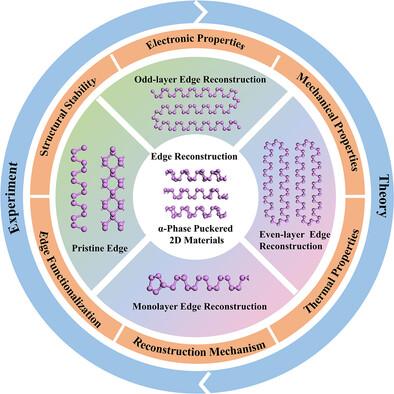The Unique Edge Reconstructions and Related Edgeless Properties of Mono- and Few-Layered α-Phase Puckered 2D Materials
引用次数: 0
Abstract
The edge reconstruction of two-dimensional (2D) materials is significant for the stability, properties, and applications. Significant progress has been made in understanding the edge reconstruction of 2D materials. Herein, an overview of the latest theoretical and experimental advances on edge reconstruction of α-phase phosphorene nanoribbon and IV–VI group binary compounds MX (M = Ge, Sn; X = S, Se), focusing on the mechanism, stability, physical, and chemical properties of the edge reconstructions is provided. The status, challenges, and contradictions in experiments and theory are addressed and the progress in edge reconstruction of α-phase puckered 2D materials as well as the effects of edge reconstruction on physicochemical properties are systematically introduced. A novel tube-like edge reconstruction is suggested to be universal for α-phase puckered monolayers. While ZZ(U) edge can be another important reconstruction in bilayer. Beyond the review, the edge structures of phosphorene have odd–even layered oscillations are also proposed. The edge terminations can affect the exfoliation mechanism and electronic, transport properties. Interesting, unique U-edge, which has been verified by experiment, exhibits nearly edgeless electronic and thermal transport, which is beneficial for ultrafast microelectronics.

单层和少层α相皱褶二维材料的独特边缘重构及相关无边特性
二维(2D)材料的边缘重构对于材料的稳定性、性能和应用意义重大。人们在了解二维材料边缘重构方面取得了重大进展。本文概述了 α 相磷烯纳米带和 IV-VI 族二元化合物 MX(M = Ge、Sn;X = S、Se)边缘重构的最新理论和实验进展,重点介绍了边缘重构的机理、稳定性、物理和化学性质。论文探讨了实验和理论的现状、挑战和矛盾,系统介绍了α相皱褶二维材料边缘重构的进展以及边缘重构对物理化学性质的影响。提出了一种新型管状边缘重构方法,该方法对α相皱褶单层材料具有普遍意义。而 ZZ(U) 边缘可能是双分子层中另一种重要的重构。此外,还提出了具有奇偶层状振荡的磷烯边缘结构。边缘终端会影响剥离机制和电子、传输特性。有趣的是,经实验验证,独特的 U 型边缘表现出几乎无边缘的电子和热传输特性,这对超快微电子学的发展大有裨益。
本文章由计算机程序翻译,如有差异,请以英文原文为准。
求助全文
约1分钟内获得全文
求助全文

 求助内容:
求助内容: 应助结果提醒方式:
应助结果提醒方式:


